
Feb 6
NCAA Changes Transgender Policy to Limit Women's Competition to Athletes Assigned Female at Birth
Eric Olson READ TIME: 3 MIN.
The NCAA changed its participation policy for transgender athletes on Thursday, limiting competition in women's sports to athletes assigned female at birth only.
The move came one day after President Donald Trump signed an executive order intended to ban transgender athletes from girls' and women's sports. The order gives federal agencies latitude to withhold federal funding from entities that do not abide by Title IX in alignment with the Trump administration's view, which interprets "sex" as the gender someone was assigned at birth.
The NCAA policy change is effective immediately and applies to all athletes regardless of previous eligibility reviews. The NCAA has some 1,100 member schools with more than 500,000 athletes, easily the largest governing body for college athletics in the U.S.
"We strongly believe that clear, consistent, and uniform eligibility standards would best serve today's student-athletes instead of a patchwork of conflicting state laws and court decisions," NCAA President Charlie Baker said. "To that end, President Trump's order provides a clear, national standard."
The NCAA policy that went into effect in 2022 adopted a sport-by-sport approach, where transgender participation was determined by the policy of the sport's national governing body. In sports with no national governing body, that sport's international federation policy would be in place. If there is no international federation policy, previously established IOC policy criteria would take over.
Over the past year, however, transgender athletes have been targeted by critics who say their participation in women's sports is unfair and a potential safety risk. It became a major talking point in Trump's re-election campaign even though there is believed to be a very small number of transgender athletes; Baker last year said he knew of only 10 transgender athletes in the NCAA.
The NCAA's revised policy permits athletes assigned male at birth to practice with women's teams and receive benefits such as medical care. It it not uncommon, for example, for women's basketball teams to practice against fellow students who are male.
Regardless of sex assigned at birth or gender identity, an athlete can practice and compete with a men's team assuming they meet all other NCAA eligibility requirements.
However, the NCAA said an athlete assigned female at birth who has begun hormone therapy (testosterone, for example) can practice with a women's team but cannot compete on a women's team without risking the team's eligibility for championships.
Member schools remain responsible for certifying athlete eligibility for practice and competition. The NCAA also said schools are subject to local, state and federal legislation and such legislation supersedes NCAA rules.
The NCAA policy change was announced hours after the Trump administration said it was investigating potential civil rights violations at two universities and a high school sports league that allowed transgender athletes to compete on women's teams. The Education Department said it had opened reviews of San Jose State University, the University of Pennsylvania and the Massachusetts Interscholastic Athletic Association.
San Jose State's women's volleyball team drew headlines last season over unconfirmed allegations that the roster included a transgender player. As for Penn, three former teammates of transgender swimmer Lia Thomas have sued the NCAA, Ivy League, Harvard and the school over Thomas's participation at conference and national championships, saying it violated Title IX provisions.
The NCAA said its Board of Governors had directed staff to help all member schools foster respectful and inclusive collegiate athletic cultures, noting it has recently updated its mental health guidance.
"The updated policy combined with these resources follows through on the NCAA's constitutional commitment to deliver intercollegiate athletics competition and to protect, support and enhance the mental and physical health of student-athletes," Baker said. "This national standard brings much needed clarity as we modernize college sports for today's student-athletes."
The NCAA policy now mirrors that of the National Association of Intercollegiate Athletics, which governs sports at 241 mostly small colleges across the country. Last April, the NAIA unanimously approved a policy allowing only athletes whose sex assigned at birth is female and have not begun hormone therapy to compete.







